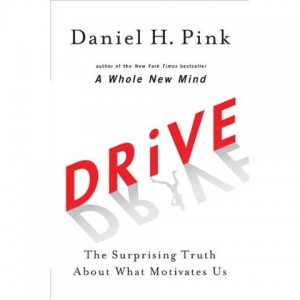Total Recall: Rebooting the Drive (or Why Motivation 3.0 is a Mandate)
It would be terrific to think that given the opportunity, everyone would unleash a wellspring of potential well beyond the current confines of our imaginations.
It would be great to think in terms of abundance, but how to do so in the competitive culture of commerce?
The challenge is, how to unleash that potential in the workplace without dismantling a significant amount of the existing business paradigm.
The truth is, it cannot be done – without first acknowledging that the old school managerial hierarchy model has already effectively failed. The erstwhile ‘program’ is showing its bugs. The carrots and sticks have lost both their motivating appeal and requisite fear factor.
After a couple of centuries, it’s about time.
According to author Daniel Pink, it’s time to lay 19th century thinking to rest, along with its fundamental managerial assumptions. Work is not a punishing toil for which we are compensated. Nor are people inherently lazy. For 21st century work, involving far less widget building, Pink drives home a trinity of what he terms Motivation 3.0 truths: “we need to upgrade to autonomy, mastery and purpose.”
If that sounds like a revolution in the wings, it is a welcome one to any workplace seeking innovative solutions and ongoing evolution.
In his latest book, “Drive: The Surprising Truth About What Motivates Us”, Pink succinctly states and subsequently illustrates that when it comes to motivation, “there’s a gap between what science knows and business does”.
In his previous book, “A Whole New Mind”, he put the ROI of the creative mind on the bottom line. With Drive, Pink draws upon extensive research to reveal its crucial relevance to any business seeking to succeed in the new era of the knowledge worker.
That knowledge worker is you – even if you are still building, building or selling widgets for a living. What is required to tap the proverbial font of innovative potential is elegantly encompassed by Pink’s three essential elements:
Autonomy: the desire to direct our own lives
Mastery: the urge to get better and better at something that matters
Purpose: the yearning to do what we do in the service of something larger than ourselves
The end result has proven only slightly shy of miraculous for individuals and businesses both. It is the equivalent of pressing an innovative hyperdrive button and rewriting the core code of the work/life balance formula.
In addition to turning work into pay, Motivation 3.0 turns work into play – relatively speaking and in accordance to profession. In short, it mends the short circuit that has plagued Motivation 2.0 for some time.
Motivation 2.0 worked well enough for 20th century tasks; however, it is in the modern 21st century moment that it is “proving incompatible with how we organize what we do, how we think about what we do and how we do what we do. We need an upgrade.”
Pink argues that this third drive is both innate and intrinsic. Most importantly, it is mandatory for any body, corporeal or corporate, seeking a better way to move from point A to point B to engage a more fruitful future now.
(PeopleTalk: Winter 2010)







